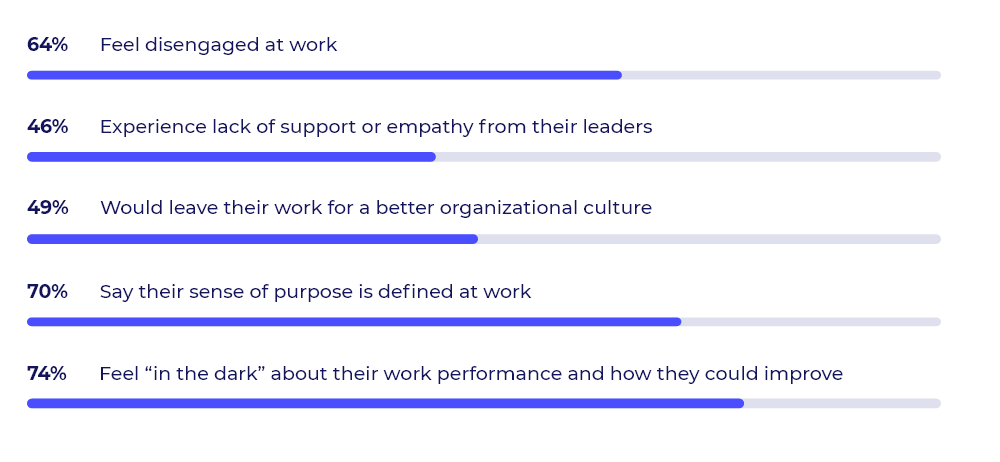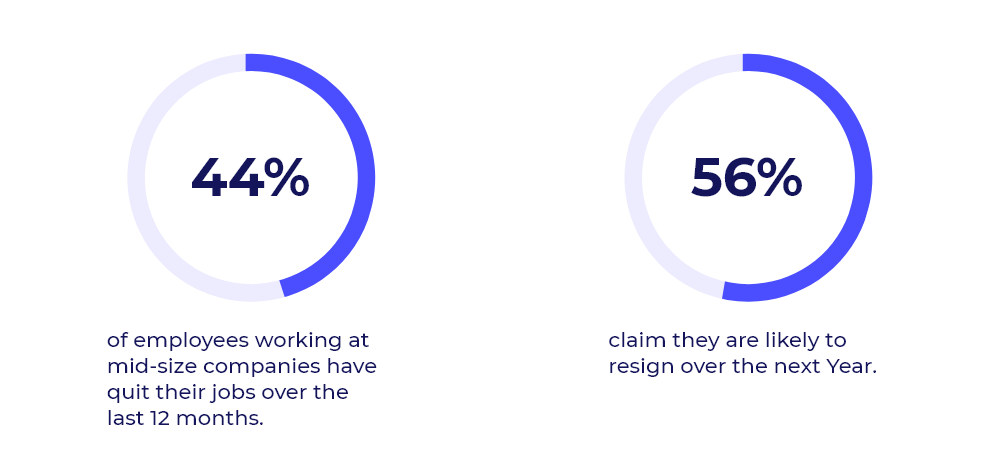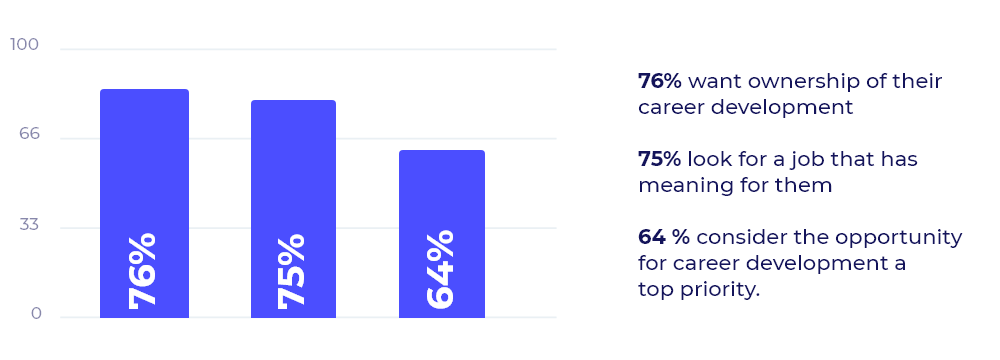Future of Work: Top-3 Trends you Need to Know Now
The future of work is here. The last 2 years accelerated changes that were already on the horizon and one thing we know for sure: the very nature of work is and will no longer be the same.
The years ahead won’t revolve around whether remote models are viable or not, but rather around transforming the workplace into a more engaging, human, and productive environment that meets the new needs and demands from employees.
What will the future of work look like over the next few years? How can you anticipate challenges and opportunities to stay ahead of the game?
1. Only Culture Can Beat The Great Resignation

The Great Resignation keeps breaking records in the US¹ and it’s hitting industries worldwide. Yes. People all across the globe are letting their employers know it’s over, and new demands from employees seem to be keeping leaders awake at night.
Why are people quitting their jobs?

Anthony Klots, the man who coined the term The Great Resignation, states that resignation rates could continue staying above average for two or three more years.² With this premise in mind, only leaders who get to see this as a golden opportunity to build a more meaningful and human workplace will be able to turn The Great Resignation into The Great Attraction.
“The Great Attrition is real, will continue, and may get worse before it gets better. Yet this unique moment also represents a big opportunity. To seize it, take a step back, listen, learn, and make the changes employees want.”
McKinsey, 2021³
So, in this scenario, how can we make sure we’ll land on safe ground? The answer: build a Human, Purpose-driven Organizational Culture.
25% of the people who resigned over the past six months, cited “toxic company culture” as their number one reason for quitting⁴.
To avoid resignation, some companies choose to offer employees an increase in pay, promotions, or staying bonuses. But, truth be told: these are only short-term incentives whose impact dissipates within months. In fact, nearly half of the people who quit say they’d leave their current job for a lower-pay at a company with a better culture.

This moment represents a tectonic shift in the world of work, and organizations need to get radical. They must rethink their relationship with work, prioritize employee satisfaction and build a culture that responds to the physical, psychological, social, and emotional needs from their employees today.
In this future of work, culture has become the main differentiator between being a company people want to leave and a company where people want to build community and make a life. Culture is and will continue to be the main driver of change, and the time to build a more human workplace that attracts, inspires and retains talent is now.
2. GenZ: The Game Changers in The Future of Work

GenZ is the generation born from 1997 to 2012, and guess what? They are ready to put the world of work upside down. The youngest GenZs are in their mid-twenties today and in just eight years, one in three workers will be GenZ⁵. Does this mean you should start planning your strategies to attract them in 8 years time? No.
Although they represent only 11.5% of the U.S. workforce today, Generation Z finds itself already working in tough industries at a tough time. The impact of COVID-19 has given them a unique crisis experience and this represents a great challenge for companies in terms of talent attraction: they need to earn back the trust of a generation that feels employers didn’t step up in a time of crisis.
What do GenZ want from organizations?
They look for fulfillment, meaning, recognition, and connection at work, and will only choose jobs that meet these needs⁶. They’re not in it for old-school management and are attracted to companies with social responsibility and a healthy culture⁷.

That’s how Gen Z-ers are playing the game. They’re like silent fighters, rewriting policy under the nose of the boomers.” Coleman, The New York Times⁸.
Without a doubt, GenZs are the game changers in the future of work and they will continue disrupting and reshaping the status quo of the workplace in the years to come.
CEOs and top leaders are now at a crossroads: either they rethink their organizational culture and offer them the purpose they seek, or they will fail to attract and retain this generation of employees.
3. The Metaverse Could Shape the Workplace Forever

With the pandemic accelerating the migration to remote models, the future of work might be on the cusp of a groundbreaking technology paradigm shift: the metaverse.
Let’s start with a basic question: what even is metaverse? Metaverse is now a buzzword that we use to describe a network of 3D virtual worlds where we can interact with others using avatars through VR and augmented reality headsets.
As companies like Facebook, Nike, JP Morgan, Hyundai, Siemens, and Toyota are investing big in the concept of shared worlds, more organizations start evaluating how the immersive experiences that the metaverse offers may allow people to connect, collaborate and relate to one another in completely new ways⁹.
What role will the metaverse play in the future of work?
Recent research from Global Data¹⁰ shows that in the year 2021, more than 40% of the companies around the world referred to the metaverse as the virtual universe in which they plan to improve the experience and productivity of their employees.
The metaverse approaches they point out are:
- virtual avatars to improve experiences for remote workers
- engagement and collaboration to boost people’s connection
- the metaverse as a way to improve employee onboarding and productivity
Leading global companies are already leveraging the metaverse for hiring people and even opening offices in the virtual world¹¹, but the truth is that its role in the workplace is still at an experimental stage, and every organization seems to have its own vision of it.
Although it’s still uncertain how the metaverse will actually transform the workplace in the years to come, we can tell there is a whole life unfolding in it today, and Gen Z is definitely leading the way. In fact, Deloitte’s 2021 Digital Media Trends report¹²pointed out that participation within the metaverse is key if we want to attracts and engage with Gen Z.
This means that sooner or later, CEOs, managers, and People Experience areas will have to start thinking about the role that the metaverse will play in their business and cultural strategies.
And now what?
What these 3 trends clearly show us is that we’re experiencing fast-paced and accelerated transformations in the world of work, and as businesses and organizations evolve, so should the culture within them. The sooner you design a culture strategy with defined values and goals aligned to future needs and demands, the more likely you are to gain a competitive edge and act proactively.
So here are some actionable tips you might want to consider today if you want to lead your company into the future.
Actionable Tips
- Don’t let your culture “happen organically” in your organization. Design a culture prepared to attract, inspire and retain the best talent.
- Make sure you have the right technology to measure and supercharge your culture. This way, you will be able to anticipate challenges and opportunities to improve the commitment and performance of your employees.
- Engender a sense of belonging, recognizing people and making them visible for their values and contributions.
- Co-create culture with your employees, making feedback and sincere recognition part of every day.
- Make sure your culture is data-driven and human enough to offer the development opportunities and emotional connection people need in real time.
At StarMeUp we want to help organizations like yours to build and manage a culture that truly makes a difference in people’s lives. We do it the way the world’s largest platforms build community: via human nature and technology; through sincere recognition, and authentic human relationships.
Find out more about what the power of culture and technology can do for your company!
Visit our website
Follow us on Instagram, Facebook, LinkedIn and Twitter
Sources:
¹ Insider. “Over 4 million Americans have quit their jobs for 9 months straight — and it shows how workers have changed the status quo”. By Juliana Kaplan and Madison Hoff. March 29, 2022.
² Fortune. “The Great Resignation could last for years, says the expert who coined the term”. By Colin Lodewick. April 4, 2022.
³ McKinsey “‘Great Attrition’ or ‘Great Attraction’? The choice is yours”. By
Aaron De Smet, Bonnie Dowling, Marino Mugayar-Baldocchi and Bill Schaninger. September 8, 2021.
⁴ CNBC. “Toxic company culture is the №1 reason workers are quitting jobs, survey finds”. BY Kate Dore. April 13, 2022.
⁵ Great place to work “What We Know About Gen Z in the Workplace”. By Kalia Simms. November 10, 2021.
⁶ Randstad. “Engaging the Workforce of the Future. The emergence of Generation Z”. By Jim Link.
⁷ NY times. “Need to keep Gen Z workers happy? Hire a generational consultant”.
⁸ NY Times. “Young people are going to save us all from office life”.
⁹ Tech HQ. “Can the metaverse enhance the future of work?”. By Aaron Raj. May 3, 2022.
¹⁰ Global Data.
¹¹ Cointelegraph “The future of work: Companies open offices in the metaverse”. By Ezra Reguerra. March 09, 2022.
¹² Venture Beat. “Deloitte: Younger generations have one foot in the metaverse via gaming and social media”. By Dean Takahashi. March 28, 2022.